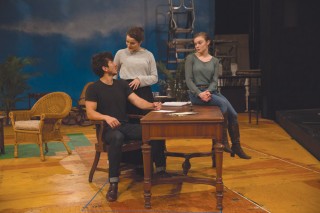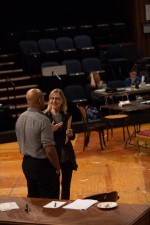Title

Alexander Shaw, Lauren Donahue, and Victoria Pollack on the set of George Bernard Shaw's 1909 farce Misalliance.
(Photo by Rosalie O'Connor)Each fall, the fourth-year drama students mount three fully produced plays as they begin what the division calls their bridge to the profession. This season begins with George Bernard Shaw's 1909 farce Misalliance (October 12-16), an inquiry into Edwardian gender roles and marriage mores directed by Janet Zarish (Group 5). We spoke with three of the actors—Lauren Donahue, Victoria Pollack, and Alexander Shaw—about their characters and about beginning the rehearsal process.
Body
What's your role?
Victoria Pollack: Lina Szczepanowska, who's a fearless Polish acrobat who literally falls from the sky into the backyard of a well-to-do British family. She's an independent, honor-driven woman, who is rather allergic to marriage—which of course means all of the men are fawning over her. She's lots of fun!
Lauren Donahue: I'm playing Mrs. Tarleton. Shaw describes her as a shrewd and motherly old lady who has been pretty in her time, and is still very pleasantand likable and unaffected.
Alexander Shaw: A mysterious man called Gunner who (spoiler alert) breaks into the mansion to kill both the head of the house and himself to avenge his mother. What's a comedy of manners without a good murder-suicide? Probably not a spoiler to say I don't succeed.
Have your initial impressions of the play changed?
AS: Oh, absolutely. Because it's the Edwardian period, a lot of the characters seemed mannered on the first read, but the play has started to feel really modern to me. The restlessness of the era feels very much like contemporary America—we're sitting just beyond the crest of a new age of enlightenment, and now we're dealing with the anxiety and disillusionment that comes in the wake of that. It's totally the world that these characters live in, and as their heartbeats start to emerge, I'm beginning to deepen my first read of the play, which was just that it was vaguely musical and British.
VP: They always do! Shaw wrote plays and essays that exposed contradictions within the social conventions and political circumstances of his time. In my initial read, I saw Lina as a symbol of female independence who popped out against the background of this prim and proper British social hierarchy. With subsequent reads and research, including some trapeze work at a circus school, I've gotten to know her better as a three-dimensional, beautiful, and fallible human being who loves the thrill of a real risk, living by her own standards, and honoring what she wants by actually doing it. I admire her tenacity and her will to speak up.
LD: At first I was expecting a complex plot and, to be frank, found the play a bit tedious and uneventful. But on the first day of table work, our director opened up a conversation that changed my initial impressions. She suggested that Misallianceis a play of ideas and that the true action of the play lies in the characters' energetic passion in asserting their opinions. The talk is the drama of this play and Shaw is teaching his audience something through the art of argument. Ultimately, I was genuinely surprised at how much this play is relevant to present day. Shaw's characters are hungry to debate, but they're also hungry to be swayed. I believe much more would get accomplished in the world if politicians and world leaders were willing to communicate with grace. That seems like a simple solution to a complex problem but truly, if everyone was as hungry to be challenged as they were to challenge, conversations would emerge and people would simply talk!
What happened today that wouldn't have when you were a first-year?
LD: Before today's rehearsal started, I allotted 15 minutes to warm up before we did our first read. That wouldn't have occurred to me as a first-year but I've come to realize how important it is to warm up your body and voice even if you're just working at the table. Doing five minutes of Alexander work allowed me to be able to sit and be fully present for long periods and a quick vocal warm up allowed me to drop into the English accent with confidence.
And “playing at the table” is a concept I wouldn't have understood in my first year. I remember in second year, one of our acting teachers, Becky Guy, brought up the question “How much can you do on the first day?” When you're reading a play aloud for the first time as a cast, it isn't enough to sit and read. I now have the tools to establish relationships between other characters at the table right off the bat, to “come off the page” more as I read, and to even perform some of the stage directions in a scene. I think you hear the play in a more active way when everyone practices this. Also, as a first-year I think I would have been more hesitant to speak up during table discussions. One of the greatest lessons I've learned at Juilliard is to trust that I have something important and worthy to contribute to a rehearsal room.
VP: For one, I'm much more comfortable when I am at a first read. Now I come to the table with as much preparation as possible—having read the play several times and done research on the playwright, the social circumstances, the kind of life I might have had as the character, the political concerns of the time, etc.—and then I allow myself to surrender to the rest of the room: to the director's ideas, to my new questions, to the choices my fellow actors are making. The first rehearsal is the first formal opportunity to play with other actors. Coming to the table prepared lets you luxuriate in all of that wonderful play!
When I started here, I was somewhat unnerved if I felt like I didn't have the “answers” to certain moments, but I've learned to love the aspects of the play that I haven't yet “solved.” You never completely solve a play, you just get to know it better and better the more you live in it. It's like a person—it's never just one thing, and there's always something grander and deeper to discover. That's the best part of rehearsal—it's the glorious mulch where you get to discover something really great.
Also, now at first reads, I find myself thinking of something Richard Feldman told us during our first year: “We don't have much time, so we must work very slowly,” meaning that you owe it to your company, the play, and yourself to go step by step and not get ahead of yourself. I definitely brought that with me to the table today!
AS: Well it was a busy day: we had our first read-through of Misalliance this morning, then went straight to the monologue showings for the first- and second-years, and then we opened our show, Daddy Issues, in the Playwrights Festival. But something that didn't happen to me today that would have happened to me when I was a first-year is that I didn't completely lose my mind. I didn't have time to get too in my head about anything, which for me is a gift.
Also I did expect this thought to come up today: “You're a fourth-year, so it better be at least this good,” with some arbitrary bar of greatness, or whatever, which of course is meaningless and not at all helpful. Thankfully, that thought didn't come up; what did instead was, “what am I working for today? What's happening in the room right now?” Which is a pretty simple idea, but it took a lot—a lot—of work for me to be able to take that thought for granted.
Is there a way in which playing this role is a culmination of your Juilliard experience?
VP: I'm definitely using everything I've accumulated in my toolbox from my Juilliard training. Shaw is a notoriously opinionated and wordy playwright, so I'm putting all of that voice and speech work into practice—both in terms of navigating thoughts and expressing them in a Polish accent. Furthermore, Lina is an acrobat so all those hours in Moni [Yakim]'s and Darryl [Quinton]'s classes are really paying off!
LD: Playing Mrs. Tarleton presents the challenge of combining the training with the fun, juicy imaginative work to create a character that's rooted in truth. In my time here, I've stretched my imagination beyond where I thought possible and I'm excited to exercise it even further with this role.
AS: Yes and no. The play is a mouthful. It's dialect-heavy, rhetoric-heavy: just reading it once, I was about to pull out my voice and speech notes from first-year prose. And while that's daunting, it's also great, because it means there's a lot of training to stand on top of. But the training here is so diverse that it's hard for me to imagine a single play that could on its own feel like the culmination of my entire experience. On the other hand, I could never imagine there being a play out there that I could read and think, “Oh, that? I'm totally ready for that. Everything in that I already did in school.” I don't look at school being over as in, “Now I'm done.” I think most of us feel like we're finding ourselves at the top of a really tall ladder and thinking that the sky is still pretty huge.
Victoria Pollack holds a Steinberg Fellowship; Lauren Donahue holds a Drama Council Scholarship and a Rhea Cloe and Carl Cloe Memorial Scholarship; Alexander Shaw holds a Steinberg Fellowship and a McKnight Foundation Scholarship.





